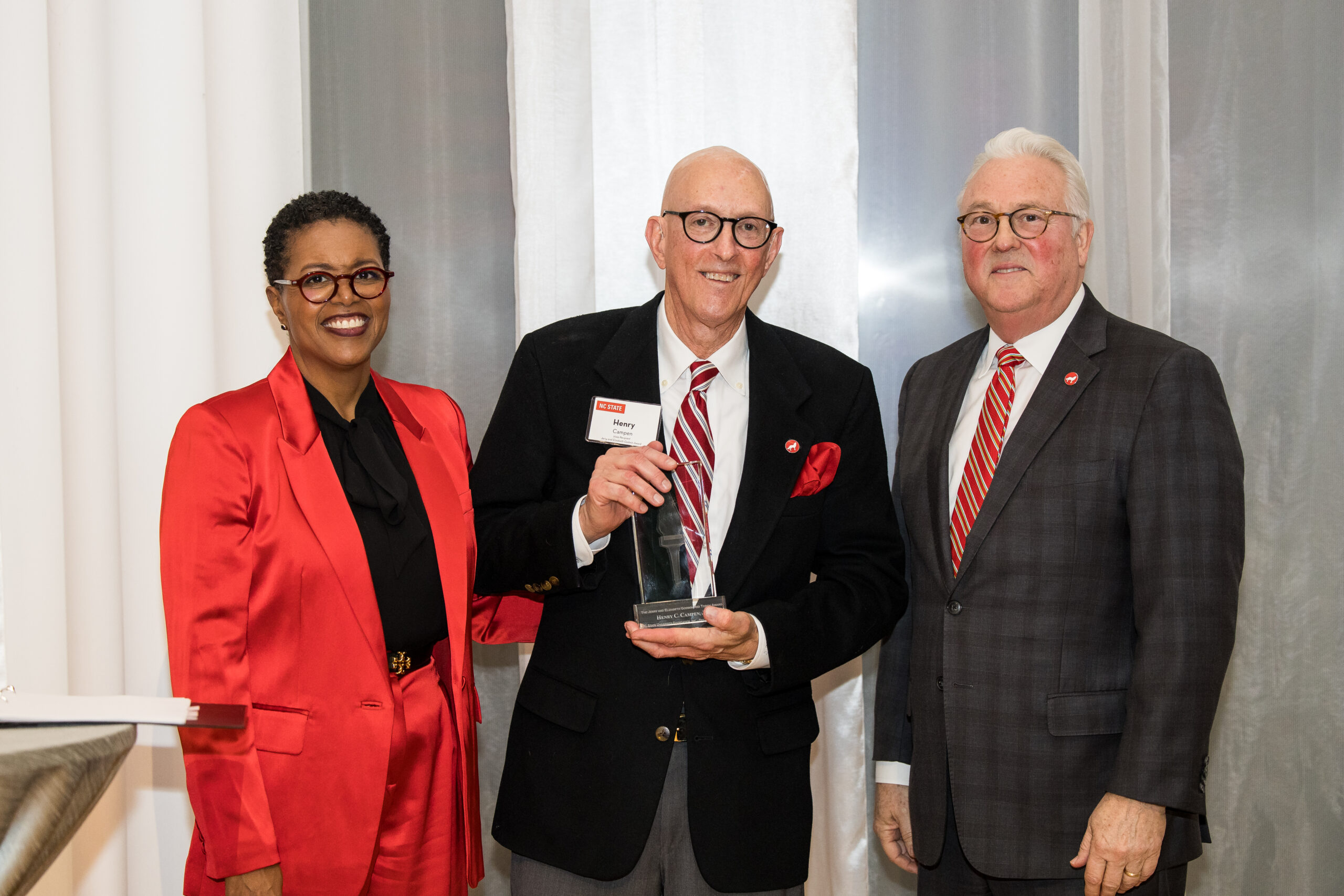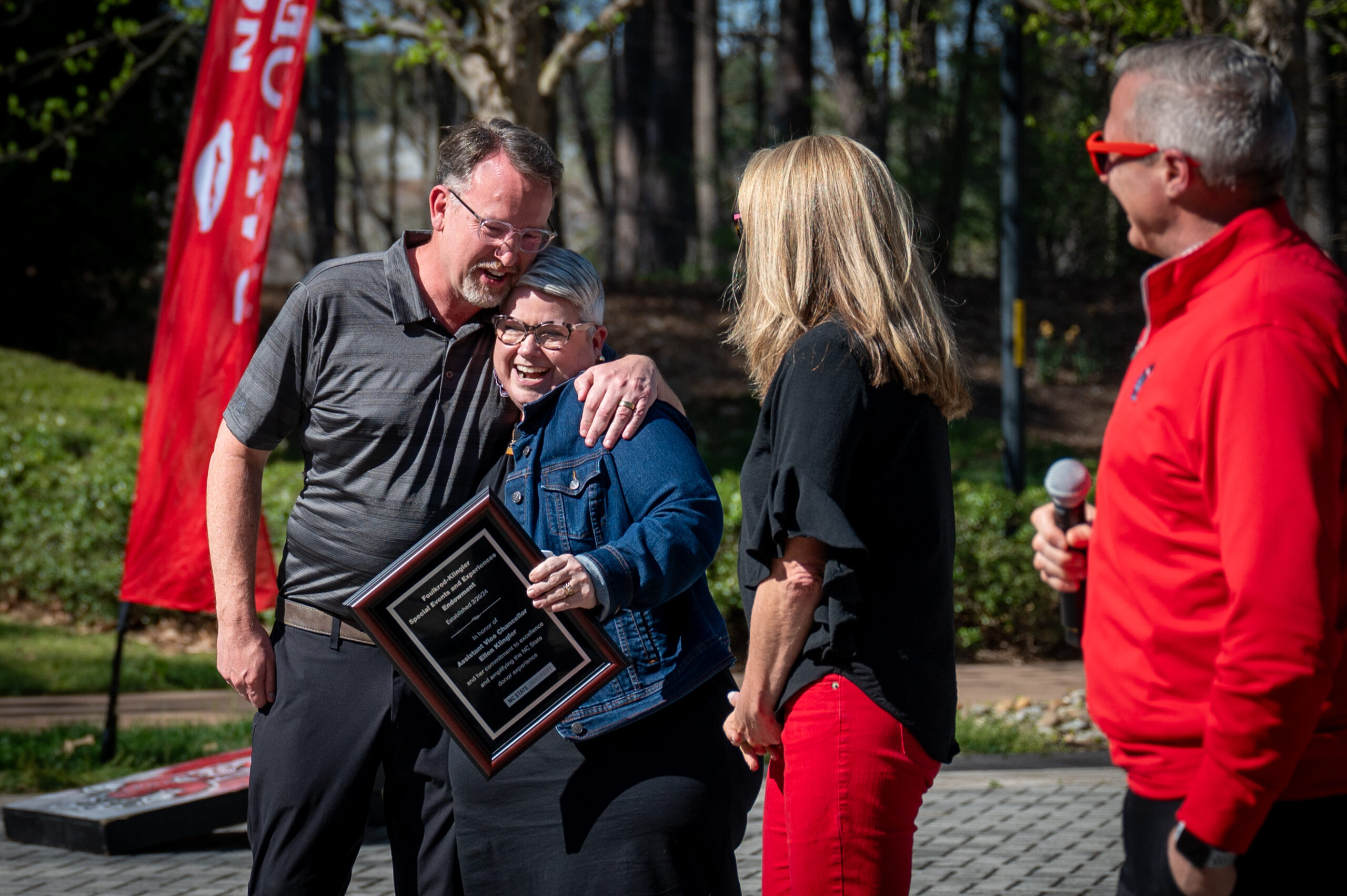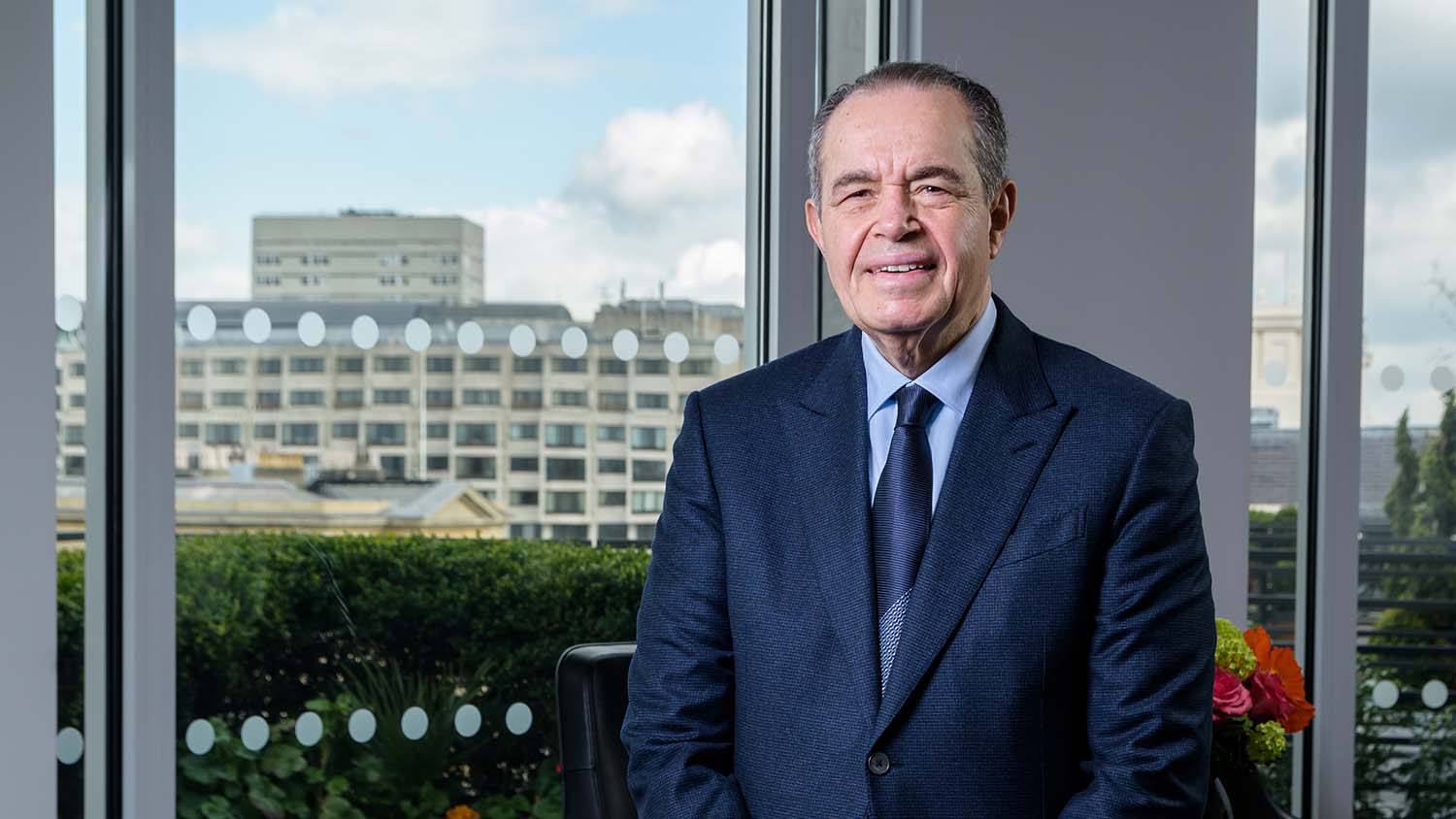A Perfect Fit
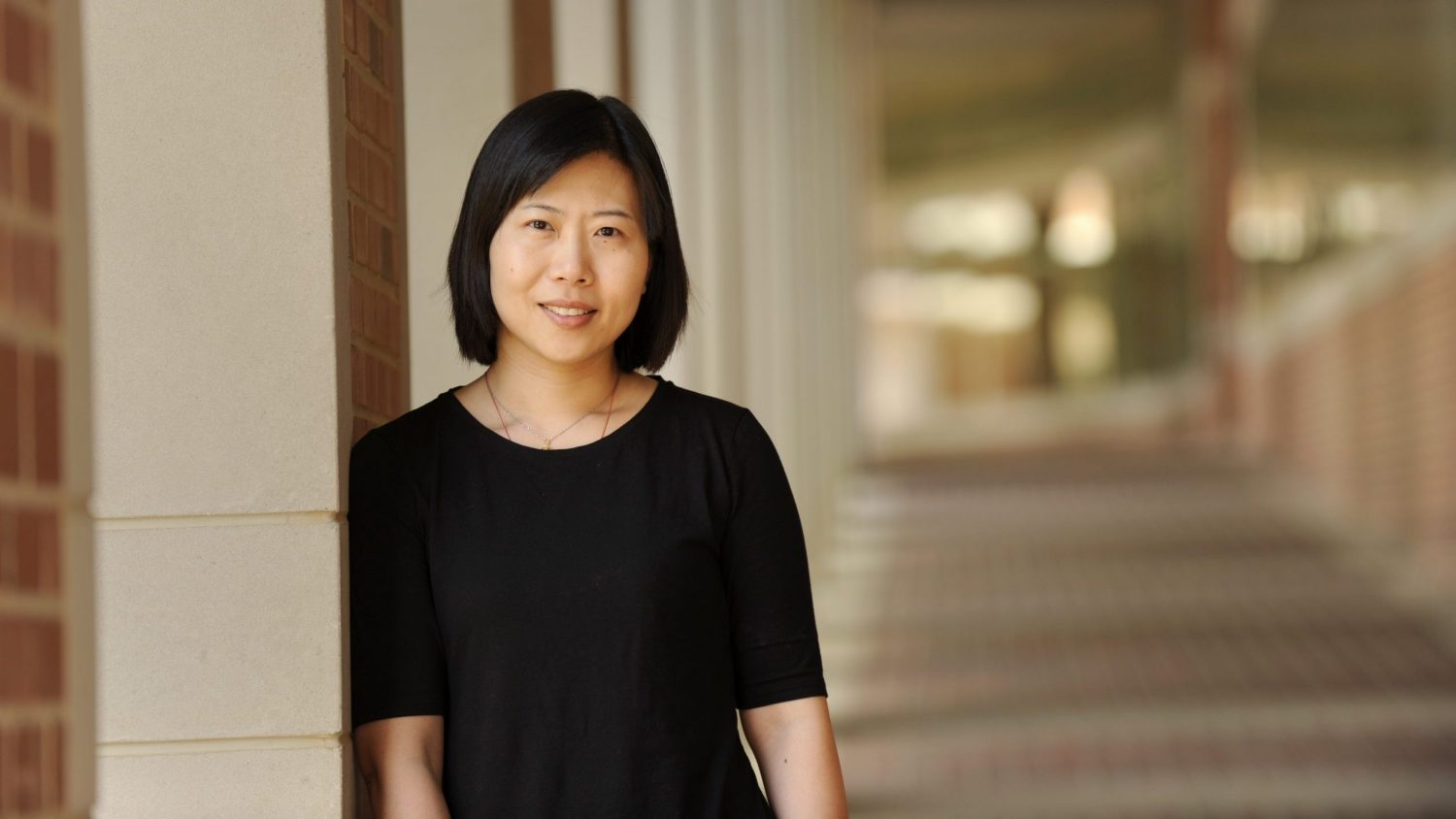
When Ira J. “Jerry” Jackson III was a child in North Carolina’s Vance County, there was little question where he would attend college. Following in the footsteps of his father, two uncles and other family members, he headed to NC State — so sure of that path he never considered applying to other schools.
“I grew up loving this university,” said Jackson, a member of the university’s William Joseph Peele Lifetime Giving Society and a lifetime member of the Alumni Association. “As a kid, I loved listening to Ray Reeve, the sportscaster doing Wolfpack basketball games on the radio, and getting the chance to go to the Dixie Classic [men’s basketball tournament] now and then. Those are wonderful memories.”
Fast-forward a few decades past his 1964 graduation, and NC State remains Jackson’s perfect fit. He has become a dedicated volunteer, advocate and donor supporting a variety of areas at the university.
In 2019, in fact, Jackson received the NC State University Foundation’s Jerry and Elizabeth Godwin Red Torch Award. The award recognizes extraordinary individuals or families who have volunteered with leadership, dedication and distinction to further the mission of NC State and the foundation, by sharing their expertise, counsel and resources.
Early in the university’s current Think and Do the Extraordinary Campaign, Jackson and his wife, Nina, recognized one gap in their NC State giving: the STEM (science, technology, engineering and math) disciplines.
Increasing support for outstanding faculty has been a key priority of the Campaign; eventually, the Raleigh residents decided to endow a faculty position. Jerry described the commitment as a gratifying way to help advance NC State’s purpose — doing work that matters.
In January 2020, Helen Huang was named the inaugural Jackson Family Distinguished Professor in Biomedical Engineering.
The professorship gift was a very personal one, rooted in family, in a long relationship with the university and even in a twist to Jackson’s perfect Wolfpack fit. It is also one of the 100 distinguished professorships created as part of NC State’s Think and Do the Extraordinary Campaign.
“I’m pleased to help the biomedical engineering department because it’s a joint department with UNC-Chapel Hill. Yes, they’re the school that we love to hate, but I think it’s absolutely beautiful to draw from the strengths of both schools to do something one couldn’t do alone,” he said.
Well-Rounded and Always Jumping In
Jackson describes himself as “always a joiner and always curious.” As an NC State student, he got involved in a range of activities, including Sigma Chi fraternity and the Interfraternity Council, ROTC and the Pershing rifle team, and the Men’s Glee Club. He served as photography editor of Technician and held a part-time job in the campus print shop as a proofreader.
While enjoying a variety of classes, he changed majors from chemical engineering to textile chemistry before earning a bachelor’s degree in textile technology.
Jackson went on to a successful career, capped as chairman of FMI Corporation, the nation’s largest provider of management consulting and investment banking to the worldwide construction industry. His book Financial Management for Contractors, published in 1981 by McGraw-Hill, remains in industry use after several reissues.
The path from textile technology to that career might seem indirect. It includes one class in cost accounting and inspiration from an NC State accounting professor, the late Emol “Doc” Fails. The journey also included key mentors and friendships, Jackson said, and invaluable lessons in expanding horizons, pursuing curiosity, thinking critically and turning ideas into reality — all originating at NC State.
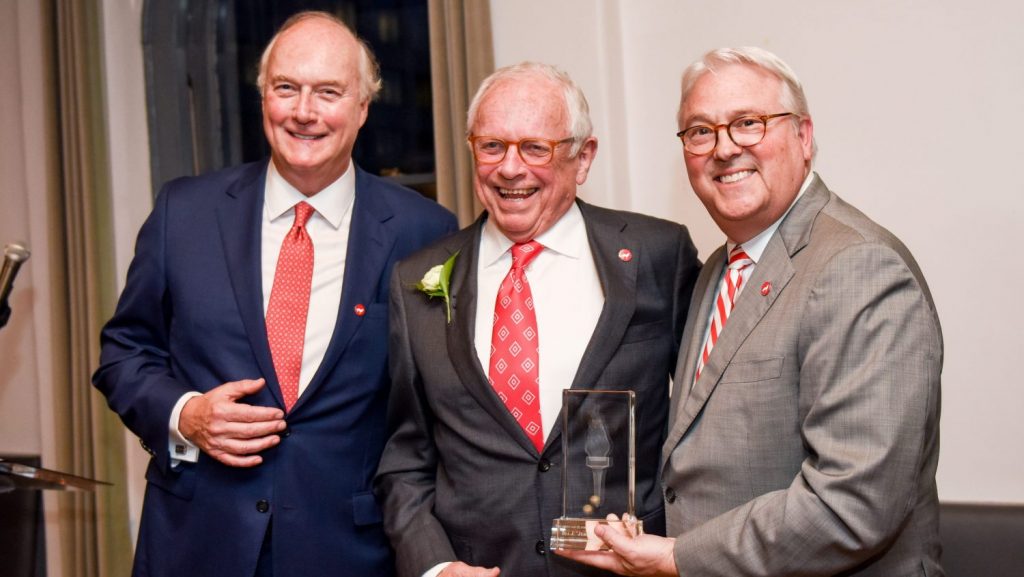
“Once you realize that the university played a role in your ability to have some success in life, I think you really have a sense that you should give back,” he added. “I had incredible mentors at NC State, and I want to make sure that this university continues to attract and support young talent. It’s the way we become truly great.”
Jackson reconnected with his alma mater several years after graduation because of the late Banks Talley, longtime university administrator. As a student, Jackson had gotten to know Talley and his wife, Louise, who worked in the financial aid office.
A phone call from Talley about his vision for expanded arts on campus led to Jackson’s service as a charter member, then the chair, of the Arts NC State Board. While helping lead the campaign to renovate then-Thompson Theatre, Jerry and Nina gave a gift to name the building’s main hall for their fathers. (Nina’s father graduated from NC State.) Their university involvement continued to grow, linked to their broad interests.
The Jacksons co-chaired the campaign to renovate the historic chancellor’s residence into the Gregg Museum of Art & Design — naming the formal garden there for their mothers and establishing an endowment to support outdoor programming. They received the university’s Bowers Medal of Arts in 2011 for dedication to the mission of bringing the arts to NC State students and the community.
“If you’ve been away for a while, what you know about this university probably only scratches the surface,” Jackson said. “The more involved that Nina and I became, the more passionate we became about the depth and breadth of extraordinary things happening. We became more aware of the limits of state funding and the need for corporate and personal donors to take NC State to the next level, along with the critical need to grow the endowment.”
Jackson served on the NC State University Foundation Board from 2010 through 2017, including a term as its chair, and has been a lead volunteer for JC Raulston Arboretum. The couple has established an endowment to provide study abroad scholarships and has supported the Wolfpack Club, Student Emergency Fund, Our Three Winners Fund, Employee Dependent’s Tuition Scholarship and Military and Veteran Services, among other areas.
When it came to a STEM gift, Jackson discovered the same kind of certainty he had felt as a teenager preparing for college.
A few years prior, he had been diagnosed with Type 2 diabetes. His and Nina’s son, Jay, and daughter, Lane, were each diagnosed with Type 1 years before that. When Jackson began learning about the Joint Department of Biomedical Engineering’s innovative work to integrate and harness engineering, math, medicine and science to enhance the health and quality of daily life for people with diabetes, cancer, disabilities and more, he soon found his philanthropic fit.
“It just popped off the page,” he said. “Technology and knowledge have advanced so much in improving lives, and we want to see that continue.
“If you feel at all neutral about supporting NC State, I encourage you to get actively involved in an area that interests you. Find a faculty member or administrator in an area that matches your passions and strike up some conversations. I think you’ll be impressed with what’s going on and want to be part of it.”
Fitting Technology with Human Need
Huang, who earned her bachelor’s degree from China’s Xi’an Jiaotong University and her master’s and doctorate from Arizona State, joined NC State’s faculty in 2013. She serves as director of the Closed-Loop Engineering for Advanced Rehabilitation (CLEAR) Core team.
A 2015-2016 University Faculty Scholar, she has a list of honors that includes her induction earlier this year as a member of the College of Fellows of the American Institute for Medical and Biological Engineering. The College of Fellows comprises the top 2% of medical and biological engineers, and she was chosen in recognition of outstanding contributions to rehabilitation engineering by developing breakthrough technology for assistive robotic prostheses and exoskeletons.
Being named the Jackson Family Distinguished Professor is certainly among her greatest honors, Huang said.
“Everyone doesn’t get that opportunity to be a DP,” she said. “You have to be doing innovative research of high importance. It means a lot to me and to the lab’s students — it’s affirmation that people recognize the hard work we’re doing every week and are willing to provide additional funds.”
Huang’s cutting-edge research targets patients — such as amputees or those who have suffered strokes — with physical disabilities that leave them with limited or low mobility, and impaired daily functions.
“We are not medical doctors on my team,” she explained. “We’re learning how to use engineering approaches to build devices that can merge with the human body to help someone move or perform daily tasks, or be able to continue doing things they love to do. Our goal is restoring quality of life.”
The additional funding that comes annually to a distinguished professor particularly helps fund graduate student research, Huang said. A student might have an innovative idea, for example, and she is able to provide funds for a pilot study to generate data that can then help the team apply for larger financial grants.
“Where does the money come from at first to explore an idea? A professorship is a tremendous help,” she said. “These are the ideas that eventually may lead to tech transfer, real-world application and even spinoff companies. The research is not only impacting society and lives, but it can mean a lot for the economy too by translating into job opportunities locally and nationally.”
In addition to providing additional opportunity for talented students, private support helps the department do more of what Huang called high-risk, high-reward research, and to build its reputation and competitiveness.
And while her team isn’t made up of medical doctors, the joint department’s partnership means that what happens in her engineering lab can be tested by UNC-Chapel Hill School of Medicine clinicians and with rehabilitation patients in areas like orthopedics and prosthetics.
“It’s a very, very unique collaboration,” Huang said. “You have multiple faculty in multiple departments working together, building bridges and connections. I’m excited to continue building up what we’re doing and to make North Carolina one of the best known leaders in the engineering and science of rehabilitation.
“I highly appreciate the distinguished professorship opportunity — for NC State, for me and for my entire lab team.”
Huang’s work and that of her entire department, aimed at empowering people to be more active and productive, is a perfect fit for Jackson’s philanthropic intentions, indeed.
“It’s amazing to know that there’s research going on at NC State that will mitigate the challenge of living with a chronic disease or disability,” he said. “We’re so excited to support that kind of work — it’s literally what ‘Think and Do’ is all about. To see a technology on one hand and to see a need on the other — to be able to fit those together in a way that can improve the human condition — that’s inspiration.
“That’s real talent. That’s magic. That’s extraordinary.”
